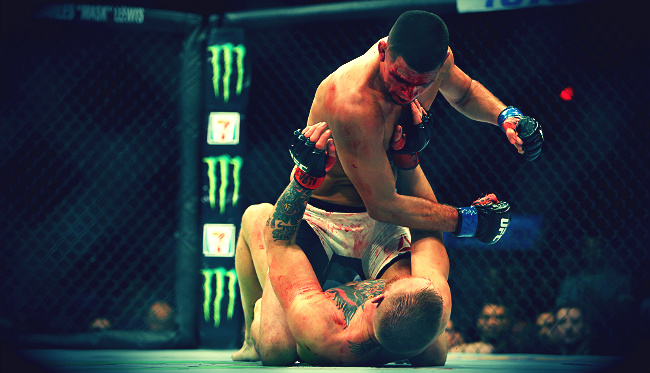
In past years, the idea of an immediate rematch typically carried with it a tag of controversy that justified its existence. Whether it was a judging error, referee snafu, or otherwise, getting two fighters back together right after they finished a memorable bout generally had a purpose. The intent behind the idea has become a bit muddled over time, and in the modern era, immediate rematches are now more ubiquitous. As the sport has evolved and has become marketed differently, the role of these matches has changed dramatically.
In the case of this weekend’s UFC 202 headliner between Conor McGregor and Nate Diaz, the logic seems to be a combination of fan interest, the circumstances that led to the first fight being booked to begin with, and Conor McGregor being able to go about his business any damn way he sees fit in the UFC. It’s certainly not because of any controversy from the first fight, in any case, and represents something of a shift in the mindset of UFC matchmakers because of that fact.
Will we start to see the immediate rematch emerge as a regular aspect of prize fighting, and if so, what can we expect? Let’s look at some recent examples for guidance.
1. Cain Velasquez vs. Fabricio Werdum
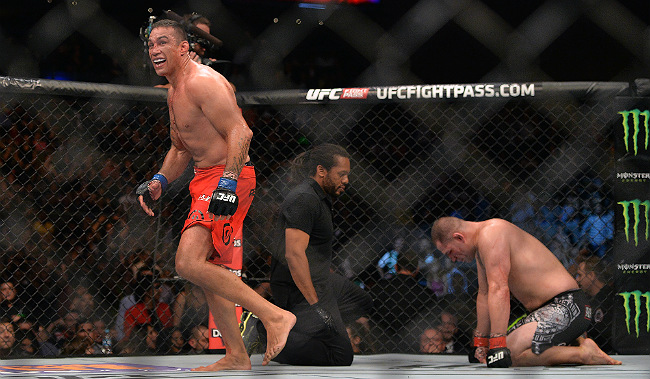
The First Encounter: UFC 188 — June 13, 2015
Looking back, it’s kind of hard to understand why we were so quick to slap labels like “Pound-for-Pound King” and “Greatest Heavyweight Ever” on Cain Velasquez. Was it because of the hype he was receiving before he ever entered the octagon? Was it the manner in which he absolutely destroyed guys like Big Nog and Brock Lesnar? Or was it that we were just hoping for some stability in the UFC’s most notoriously tumultuous division? In any case, when Velasquez was paired against the only fighter of his title reign who wasn’t named Junior Dos Santos or Antonio Silva, the result was arguably the most one-sided beatdown he had ever been on the receiving end of. Sure, it came after a two-year, injury-related absence from the octagon, but against Fabricio Werdum, Velasquez was outclassed from the opening bell until the moment he submitted to a guillotine choke in the third round. That made it all the more inexplicable when he was granted a rematch against Werdum almost immediately thereafter.
The Rematch: Fight Night 82 (formerly UFC 196) — Feb. 6, 2016
The Result: TBD. In keeping with tradition, Velasquez was forced out of the bout with a back injury less than two weeks before the event, leading to heavyweight contender Stipe Miocic getting called up to face Werdum at UFC 198. Despite being a massive underdog, Miocic managed to KO Werdum just 2 minutes into the fight, bringing a UFC championship belt with him back to Cleveland and thrusting the heavyweight division back into the chaos from whence it came.
2. Luke Rockhold vs. Chris Weidman
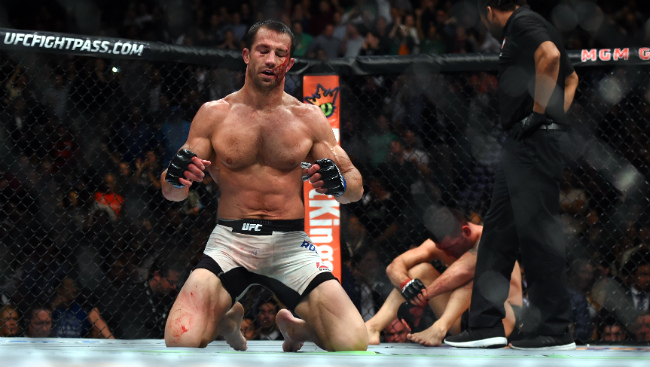
The First Encounter: UFC 194 — Dec. 12, 2015
Not unlike Velasquez, Chris Weidman’s reign over the middleweight division was consistently hampered by injury from almost day one, with his first non-Silva title defenses against Vitor Belfort and Lyoto Machida being cancelled, swapped, cancelled, and cancelled again until the heat had all but dissipated from them. In Weidman’s fourth defense, he was paired against the incredibly talented and supremely arrogant former Strikeforce middleweight champion Luke Rockhold, who promised to expose and embarrass Weidman worse than he did to that poor blonde pop singer.
Despite a strong showing in the opening rounds, Weidman soon began to fatigue as the fight progressed — no doubt hastened by the broken foot he had suffered several weeks prior. After being saved by the bell in the third round, an ill-timed spinning wheel kick from the champ in the fourth would ultimately prove to be his undoing, with Rockhold capitalizing on the mistake to score a definitive TKO victory. Regardless, the UFC would declare that Weidman vs. Rockhold II was an immediate necessity.
The Rematch: UFC 199 — June 4, 2016
The Result: Again, only time will tell. Weidman withdrew from the fight on less than a month’s notice. Michael Bisping replaced him, and now we have a British middleweight champion. I guess the lesson here is … umm … don’t take short notice fights if you’re the champ?
3. Renan Barao vs. TJ Dillashaw
The First Encounter: UFC 173 — May 24, 2014
There weren’t many people with a lot of hope for TJ Dillashaw when he was called up to face Renan Barao in the new NEW main event of UFC 173. He was only one fight removed from a loss to the man who was supposed to face Barao (Raphael Assuncao). He was a member of the notoriously unchampionable Team Alpha Male. And he was taking the fight on less than a month’s notice to boot. Toss in the fact that Barao was the latest champion being run through the “pound-for-pound king” promotional machine and you had yourself the making of an epic squash match.
Thanks to Duane Ludwig and his magic peanut butter, however, Dillashaw not only managed to survive the fight but make his “unbeatable” opponent look like a deer in the headlights from start to finish. Dillashaw annihilated Barao, dropping the “unbeatable” Brazilian on multiple occasions throughout the fight before finishing him off in the fifth round via head kick. It was truly one of the most dominant and shocking thrashings in the history of the sport
The Rematch: UFC 177 — Aug. 30, 2014
The Result: I bet you can guess how this one played out: it didn’t happen. Barao took a header in the bathtub while cutting weight, forcing former Bellator bantamweight champion Joe Soto into the main event bout on literally one day’s notice. It’s almost as if asking two guys who just spent a few rounds destroying each other’s bodies to turn around and immediately do it again is detrimental to their health, or something.
4. Frankie Edgar vs. EVERYBODY
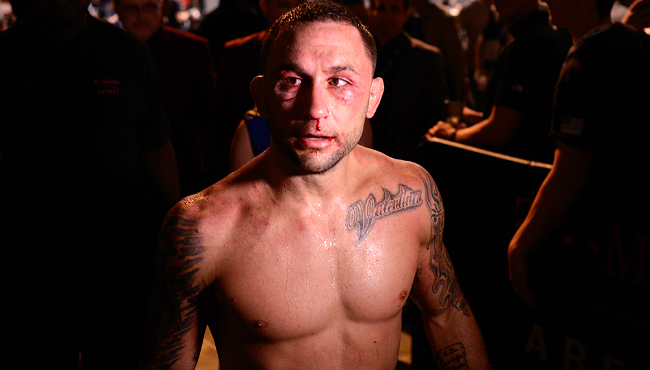
Seriously, has everyone realized that Edgar fought BJ Penn, Gray Maynard, and Benson Henderson in back-to-back-to-back immediate rematches, with the shortest fight in that span being a 4th round KO of Maynard in their immediate rematch at UFC 136? I can’t honestly remember if *any* of these immediate rematches were necessary or not (outside of the Maynard one, which followed a draw), but just figured that this was a fact worth highlighting more than anything else. Dude’s a BEAST.
5. Andrei Arlovski vs. Tim Sylvia
The First Second Encounter: UFC 59 — April 15, 2006
It might be hard to picture, but the man performing girly pushups to Evanescence’s “Bring Me to Life” in the video above was one of the most dangerous men on the planet in the mid 2000’s. He managed to earn that title not because he was bestowed with incredible athletic abilities or the gift of violence like Anderson Silva and your Jon Jones, but because of hard work and a positive mindset and literally nothing else. That man was Tim Sylvia, and for a hot second, his rivalry with Andrei Arlovski was the most intense thing your stupid eyeballs had ever seen.
Their first clash went down at UFC 51, and saw Arlovski rock and submit Sylvia early with a heel hook in less than a minute. Their second go-around saw Arlovski again find Sylvia’s chin early, then get caught with a punch rushing in that sent him into the Netherrealms. Clearly a trilogy match was necessary, but the problem here was that the UFC decided to go ahead and book it before Arlovski had even finished clearing the cobwebs from his head.
The Rematch: UFC 61 — July 8, 2006
The Result: A snorefest from bell to bell. Like I said, pushing a guy back into the octagon just three months after he’s been viciously knocked out can have some adverse psychological effects on even the toughest of fighters. “The Pit Bull” was trigger shy, “The Maine-Iac” was afraid to get overconfident, and the result was about as you would expect.
And really, there was no need to immediately book Sylvia vs. Arlovski III in the first place. Arlovski may have been caught by a flukey punch in the second fight, but since when does that count as grounds for an immediate rematch? And if an overconfident fighter charging into a KO punch is grounds enough for a rematch, then why in the hell did we never receive a Barry vs. Kongo II? Or Smith vs. Sell II?
6. Ken Shamrock vs. Tito Ortiz
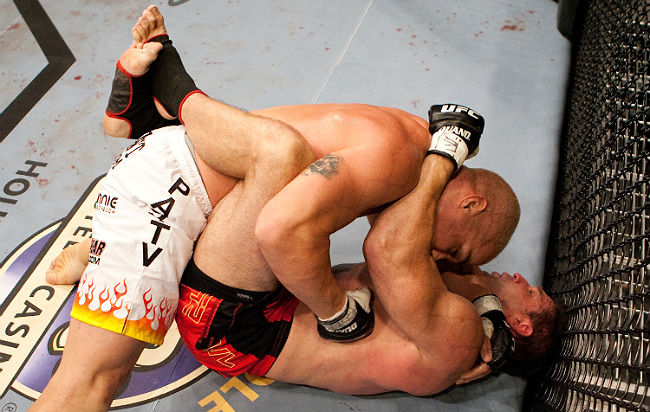
The First Second Encounter: UFC 61 — July 8, 2006
It may have been one of the most heated rivalries in UFC history, but from a competitive standpoint, Ken Shamrock vs. Tito Ortiz was incredibly one-sided. Their first fight ended with Shamrock’s face being bashed to absolute smithereens (and his corner throwing in the towel), and their second fight brought Ortiz out following a stint as a coach on The Ultimate Fighter 3. It lasted just over a minute, and Ortiz inflicted his patented GnP on Shamrock in a fight that was stopped maybe a few punches too soon. Shamrock had lost 5 out of his past 6 fights and was already a dinosaur by the time the UFC decided that a trilogy match was necessary, and the result of said trilogy match was already a forgone conclusion.
The Rematch: Fight Night 6.5 — Oct. 10, 2006
The Result: Ortiz via TKO in just over 2 minutes. While Shamrock would spend the next 10 years further tarnishing his name through embarrassing (and possibly fixed) performances and failed drug tests, he never publicly threw his support behind Donald Trump, so who’s the real winner here?
(It’s still Ortiz.)
So what have we learned? Most immediate rematches are either a.) struck down by the MMA Gods before they can actually happen or b.) end up being absolute dumpster fires.
Of course, there are a handful of examples of the concept that actually resulted in an amazing fight (Bonnar vs. Soszynski, Machida vs. Rua), so maybe McGregor vs. Diaz II will actually manage to live up to the hype this weekend. It’s already off to a memorable start, at the very least. And if it happens at all, it’s already ahead of the curve.
